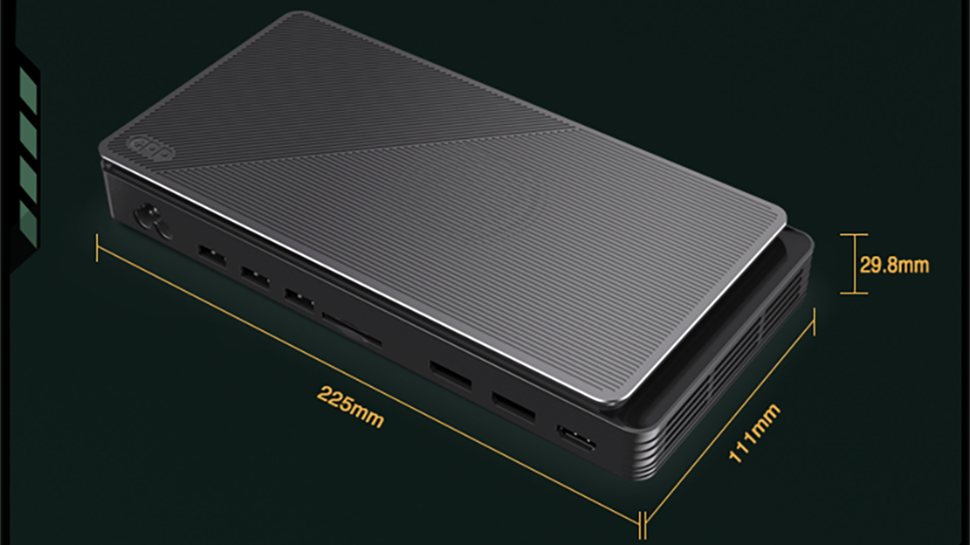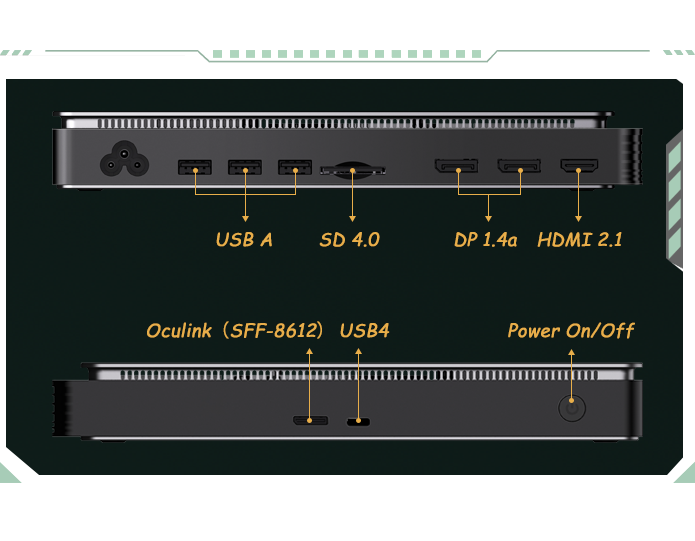
GPD has started a crowdfunding campaign to design and build the world's first external graphics processing system with AMD's Radeon RX 7600M XT GPU inside with OCuLink and USB4 interfaces to connect to its host, reports Notebookcheck. The unit promises to be one of the industry's smallest eGFX solutions if it gets developed and hits the market.
Standing at dimensions of 225 x 111 x 29.8 mm, the GPD G1 claims to be the world's smallest external GPU with laptop dock features. The unit packs AMD's Radeon RX 7600M XT notebook GPU with 2048 stream processors, 32MB Infinity Cache, 8GB of GDDR6 memory, and promises to offer up to 21.4 FP32 TFLOPS, which is in line with performance of desktop Radeon RX 6650 XT or Radeon RX 6700, according to Droix.co.uk, though only independent tests will reveal its actual capabilities.
The unit offers a range of ports, including two DisplayPort 1.4a, one HDMI 2.1, an SD 4.0 card reader, three USB 3.2 Type-A, one OCuLink (SFF-8612) connector, and one USB 4 (Type-C) port. The box packs a tiny 240W GaN power supply, so it is as small as it is with no extra power bricks and weighs only 0.92 kilograms.

Perhaps the most mysterious part about the GPD G1 are its interfaces. On the one hand, it has a USB4 interface that is ubiquitous since it is compatible with loads of PCs that are already in use and have Thunderbolt or USB4 ports. Meanwhile, it also has an OCuLink connector, which offers similar capabilities, but is barely found on any laptops. In fact, when connected using an OCuLink cable, the GPD G1 even disables USB Type-A ports and the SD slot since OCuLink is only meant to support the PCIe protocol. Meanwhile, USB4 both provides higher bandwidth and better features, so most of GPD G1 users will likely take advantage of this connection.
The OCuLink is a cable interface for four PCIe 3.0 lanes and has a maximum bandwidth of 32 GT/s, which is in line with Thunderbolt 3/4 and USB 4. Meanwhile, unlike the said interfaces, OCuLink uses SFF-8612 and SFF-8611 connectors that are not widely adopted in the PC space in general and mobile PC space in particular.
GPD may not be exactly a household brand, but Shenzhen GPD Technology Co. is a company that is widely known for ultraportable gaming notebooks. Such machines can rarely pack truly high graphics oomph and in most cases need the help of external graphics processors to run the latest games. To address its upcoming miniature Win Max 2023 PC (which itself requires funds to be developed), the company is now running an Indiegogo crowdfunding campaign to develop and build the world's first external graphics processing box with an OCuLink and a USB4 interface.
Droix.co.uk plans to sell the GPD G1 eGPU dock for around $700/£645 not including any taxes, so the part is not going to be cheap. Meanwhile, it seems that the only way to get a discount is by funding the development of the handheld gaming PC.
Remember that crowdfunding a project is not a guarantee of receiving a finished product. Backing a crowdfunded project is akin to an investment; you believe in the project and want it to succeed. You are not purchasing a retail product.






